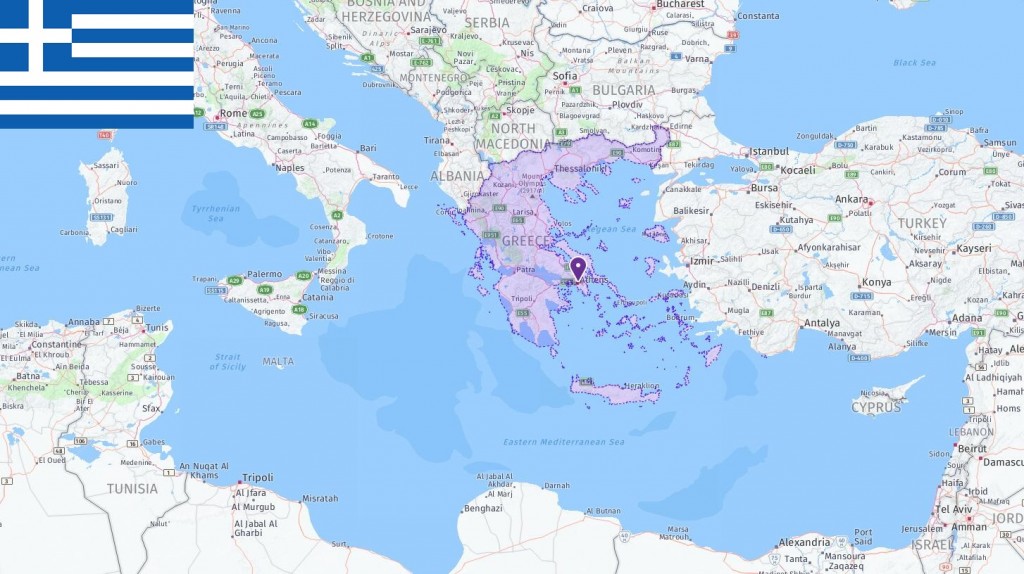GR is the abbreviation for Greece, the 95th largest country in the world. Officially the Hellenic Republic, Greece is a country located in Balkans, bordering 4 countries – Albania, Bulgaria, North Macedonia, and Turkey. Athens is the capital city of Greece. Top 10 biggest cities are Athens (population: 664,035), Thessaloniki (population: 354,279), Pátrai (population: 168,023), Piraeus (population: 163,677), Larissa (population: 144,640), Peristeri (population: 139,970), Heraklion (population: 137,143), Kallithea (population: 100,630), Acharnes (population: 99,335), and Kalamaria (population: 91,606).
Country Profile
- Capital: Athens
- Language: Greek
- Area: 131,957 km2
- Population: 10,768,466
- Currency: Euro (€) (EUR)
- Time zone: UTC+2
- Calling code: 30
- ISO 2-Letter Abbreviation: GR
- UN 3-Letter Abbreviation: GRC
- Internet TLD: .gr
- State Government Website: http://government.gov.gr
List of Greece Acronyms
The most commonly used abbreviations about Greece are GR which stands for Greece and EUR which means Euro (Greece currency). In the following table, you can see all acronyms related to Greece, including abbreviations for airport, city, school, port, government, and etc.

Geography
Greece consists of the southernmost part of the Baltic Peninsula, and the island’s rich sea area. The country has more than 2,500 islands, of which 227 are inhabited. The mainland and islands are characterized by mountains, and an irregular and steep coastline. Almost half the country consists of scanty mountains with bush growth and grass. A quarter of the land is cultivated land, while a fifth consists of forest. The country’s highest mountain, Olympos, is 2917 meters above sea level. The country has a typical Mediterranean climate with mild and rainy winters and hot dry summers.
Due to the hot climate, the country is very exposed to drought, forest fire and soil erosion. Earthquakes occur regularly. The greatest environmental challenges are pollution of water and air due to human activity.
History
Greece has been inhabited by people for thousands of years. Just when the first people settled in the area are debated, and theories range from 7 million to about 400,000 years ago. What one can safely ascertain is that the first agricultural community in Greece originated around 7000 BCE.
The history of the Greek-speaking people is estimated to have arisen around 1600 BCE. The period between 800 and 350 BCE. is known as Greek antiquity, and is often honored as the manger of European culture. Due to the impassable nature and the many islands, small independent city states emerged. Together, the urban states developed culture, politics, philosophy and scientific innovations that formed the basis for most European societies and cultures. After countless years of war between the city states, the Greek territories became subject to a number of larger empires. These include Macedonia, the Roman Empire, the Byzantine Empire and the Ottoman Empire.
In 1830 Greece was recognized as an independent state. After independence, the country struggled with great turmoil, dictatorship and conflict. In 1974, after many years of conflict, democracy was introduced and the monarchy abolished. Greece has been a member of NATO since 1951, and the EU since 1981.
Society and politics
Greece is a parliamentary republic and parliament is elected every four years. The government is headed by a prime minister. The country’s head of state is a president, elected by parliament every five years. The president can only be re-elected once, and mainly has a ceremonial role.
Since the crisis years after the global financial crisis in 2008, Greek politics has been characterized by great social, political and economic turmoil. The way politicians handled the crisis led to great distrust of politicians among the population. The austerity policy the EU imposed on the country also resulted in considerable opposition to the union. Since 2014, a large increase in immigration from North Africa has led the already weakened Greek state apparatus into a deep crisis. The country has not had the capacity to handle the flow of refugees, both the Greek population and refugees have suffered under the demanding circumstances.
Before the crisis years, Greece had a well-developed health care system, good pensions and a well-functioning social safety net. After the crisis, the social good has been under great pressure. Unemployment is very high and pension payments have been significantly reduced.
Economics and Commerce
In 2001, Greece joined the euro cooperation. Three years later, it became known that the country never really met the financial requirements for membership. In December 2009, it became clear that the country had also accumulated a large budget deficit and a huge government debt. This led the country into a historic economic handicap, which put the whole euro co-operation to the test. The country was forced to receive large rescue loans from the EU, as they committed themselves to a number of economic conditions, such as saving and implementing public reforms. The country’s economy is currently growing, but it is expected that it will take decades before it is fully re-announced after the crisis years.
The service sector is the most important industry in Greece, accounting for around 80 percent of the country’s gross domestic product. Tourism is particularly important to the country, and the country to the 16th most visited in the world. Other important industries are industry and agriculture. Greece’s main export goods are textile products, fruits and vegetables, oil products, wine and tobacco. The country has a trade deficit (they import more than they export) as imports of crude oil and petroleum products are very high.
View this article in other languages:
Deutsch – Français – 繁體中文


